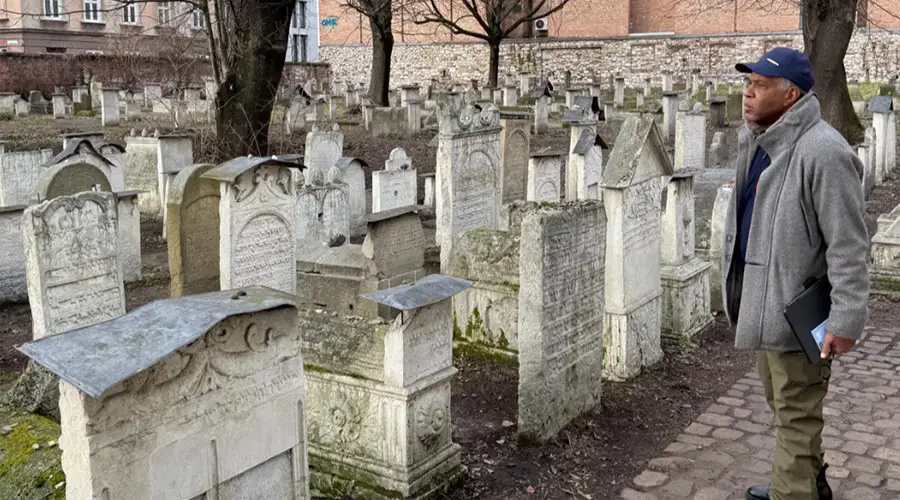Robert F. Smith’s 2025 Trip to Poland
In January 2025, entrepreneur, investor and philanthropist Robert F. Smith visited Kraków, Oświęcim and other cities in Poland as part of the Black-Jewish Solidarity Mission Trip. The trip, hosted by the Auschwitz Jewish Center Foundation, marked the 80th anniversary of the liberation of the Auschwitz-Birkenau concentration camp. Below is an article published in Denver, Colorado’s “Intermountain Jewish News” from Smith about his visit. The article examined how Smith’s experience impacted him, and he reflected on the alliances formed between Jewish and Black communities throughout the last century. The article also emphasized the importance of preserving cultural and historical sites. In addition, it highlights the importance of historical preservation and the work of Fund II Foundation, of which Smith is the founding director and President, to preserve Black American landmarks.
I had the honor and privilege to travel to Kraków, Poland, in January, 2025 as part of a Black-Jewish solidarity trip to mark the 80th anniversary of the liberation of the Auschwitz concentration camp. Our delegation consisted of leaders like Van Jones, John Hope Bryant, Pastor Carl Day, Victory Boyd and Malynda Hale.
I went to Poland to see and experience these sites for myself and meet with Holocaust survivors and hear their stories firsthand. These survivors are living witnesses to the worst form of human evil, and as time marches on, there are fewer of them to tell their stories and personal experiences living through these horrors.
I also went to mark the anniversary of the Auschwitz liberation because I believe in the transformative impact of allyship. The Black and Jewish communities have a long history of supporting each other in our joint fight for equality and justice and against bigotry, discrimination and racism — all over the world.
Black and Jewish Solidarity Throughout History
This Black-Jewish bond has persisted across generations. I often think about the Black Americans who fought against the Axis powers for the freedom of the Jewish people in Europe. One example I often come back to is that of Elie Wiesel, liberated from Buchenwald, and the Black soldier who first offered him food and support while he himself lacked true freedom back home in the U.S.
This relationship has gone both ways, as members of the Jewish community stood with and fought with Black Americans as we sought our own civil rights at home. Three of the 12 founding members of the NAACP were Jewish, and Jewish allies marched with Dr. Martin Luther King, Jr. in the South to dismantle segregation.
One of the most notable examples was the March on Washington for Jobs and Freedom, where, alongside Dr. King, Rabbi Joachim Prinz implored all communities to speak out and act.
The Black-Jewish bond is deep, and every day we must continue to ask ourselves what more we can do to support each other. When we work together, we have dismantled systems of oppression, and I know we can continue to do so.
The Importance of Historical and Cultural Preservation
What I saw in Poland profoundly impacted me. There is no substitute for seeing these sites with your own eyes; we must continue to preserve this history for people to view themselves. When the U.S. Armed Forces liberated concentration camps in Germany and Poland and walked through the fields, the barracks, the gas chambers and the crematoria, they saw evidence of atrocities so grotesque and unfathomable that General Dwight Eisenhower mandated that his troops take photos and document what they witnessed. He already foresaw a day when people would downplay or even deny that such atrocities occurred, like today, where we see rising Holocaust denialism and minimization even as survivors still walk the Earth.
I have placed a particular emphasis on preserving sites critical to Black American history, many of which have not been maintained. In 2019, I worked with the National Park Foundation and Fund II Foundation to buy the birth and life homes of Dr. King, in Atlanta.
I wanted to ensure they would be protected and preserved for future generations to learn firsthand about Dr. King and our shared American heritage.
Historical preservation is necessary if we are to truly understand and learn the lessons of history, which is why Poland must preserve not only Auschwitz-Birkenau but also the country’s historic synagogues. It is equally important for us to learn about the Holocaust as it is to learn about the thriving Jewish communities that lived in Poland before World War II and their proud history and culture.
This trip was not my first personal encounter with the horrors of the Nazi regime. I went to Dachau, the first Nazi concentration camp in Germany, over 30 years ago. At Dachau, I was shocked by the cruelty of man and disturbed by how many people stood by and allowed the atrocities at that camp to take place. These were the same feelings I experienced at the 80th anniversary of the liberation of Auschwitz.
Those experiences stood in stark contrast to my experiences more broadly in Poland and Germany, where I have been surrounded by warm and welcoming people and cultures. That discrepancy continues to serve as a reminder of what can happen to societies when people are fed enough lies, hate and vitriol.
As anti-Semitism rises across the U.S. and around the world, we have a shared responsibility to fight back against it and all forms of hate and discrimination. Anti-Jewish and anti-Black rhetoric comes from the same historical root of prejudice, dehumanization and marginalization.
Just as the Jewish people fought for Black civil rights in the U.S., I went to Poland to help ensure that “never again” means “never again.” Black-Jewish allyship has a long history, and today that bond remains strong. We must continue to bring our communities together to confront the many challenges we face and to push aside hate in all its forms.
This article first appeared in the “Intermountain Jewish News.”
